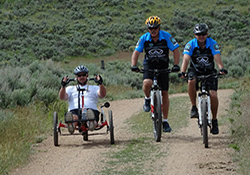Office of Research & Development |
 |
Office of Research & Development |
 |

VA Research Currents archive
February 19, 2014

Research has confirmed the psychological benefits of outdoor recreation for Veterans. (Photo courtesy of Wasatch Adaptive Sports)
Taking part in outdoor group activities, like camping, hiking, or snowboarding, could prove beneficial for Veterans with mental health problems. A recent study, funded by the Sierra Club and involving researchers from VA and the University of Michigan, suggests a link between outdoor activities and long-term psychological well-being.
The researchers surveyed Veterans one week before, one week after, and one month after a group wilderness experience. More than half the participants involved reported physical or mental health issues that were interfering with their lives.
The Veterans took part in one of 12 programs, each lasting between four and seven days. There was little, if any, structured therapy. Instead, the emphasis was on the experience. Veterans had the opportunity to go fly-fishing, kayaking, whitewater rafting, backpacking, and more.
Fifty four of the 73 Veterans participating completed the post-experience questionnaire a week after the outing. They reported a greater than 10 percent improvement in psychological well-being, a 9 percent increase in social functioning, and a nearly 8 percent gain in positive life outlook.
"The findings suggest that extended group-based nature recreation can have significant positive impacts on Veterans struggling with serious health problems," said Dr. Jason Duvall, a research scientist at the University of Michigan and one of the study's lead authors, in a statement. "Although more research is needed and many questions remain, the use of extended group-based outdoor recreation programs to ease Veterans' transition back into civilian life seems to be a promising approach."
The results mirror research conducted by Dr. Jennifer Romesser, a clinical psychologist with the VA Salt Lake City Health Care System in Utah. Romesser, wanted to help Veterans transition to civilian life. One way, she thought, would be through tackling a new skill. A snowboarding enthusiast herself, Romesser initiated a partnership in 2010 with Wasatch Adaptive Sports in the Rocky Mountains.
"The initial objective of the program was to reach out to Veterans that were hesitant to access traditional mental health treatment," she told Powder magazine for a May 2013 story. "Skiing served as a way to benefit [Veterans] by getting out, interacting with people, and taking on new challenges."
"Nature," Romesser says, "can help reconnect Veterans with the experience of positive emotion and develop a renewed sense of awe and appreciation for the outdoors."